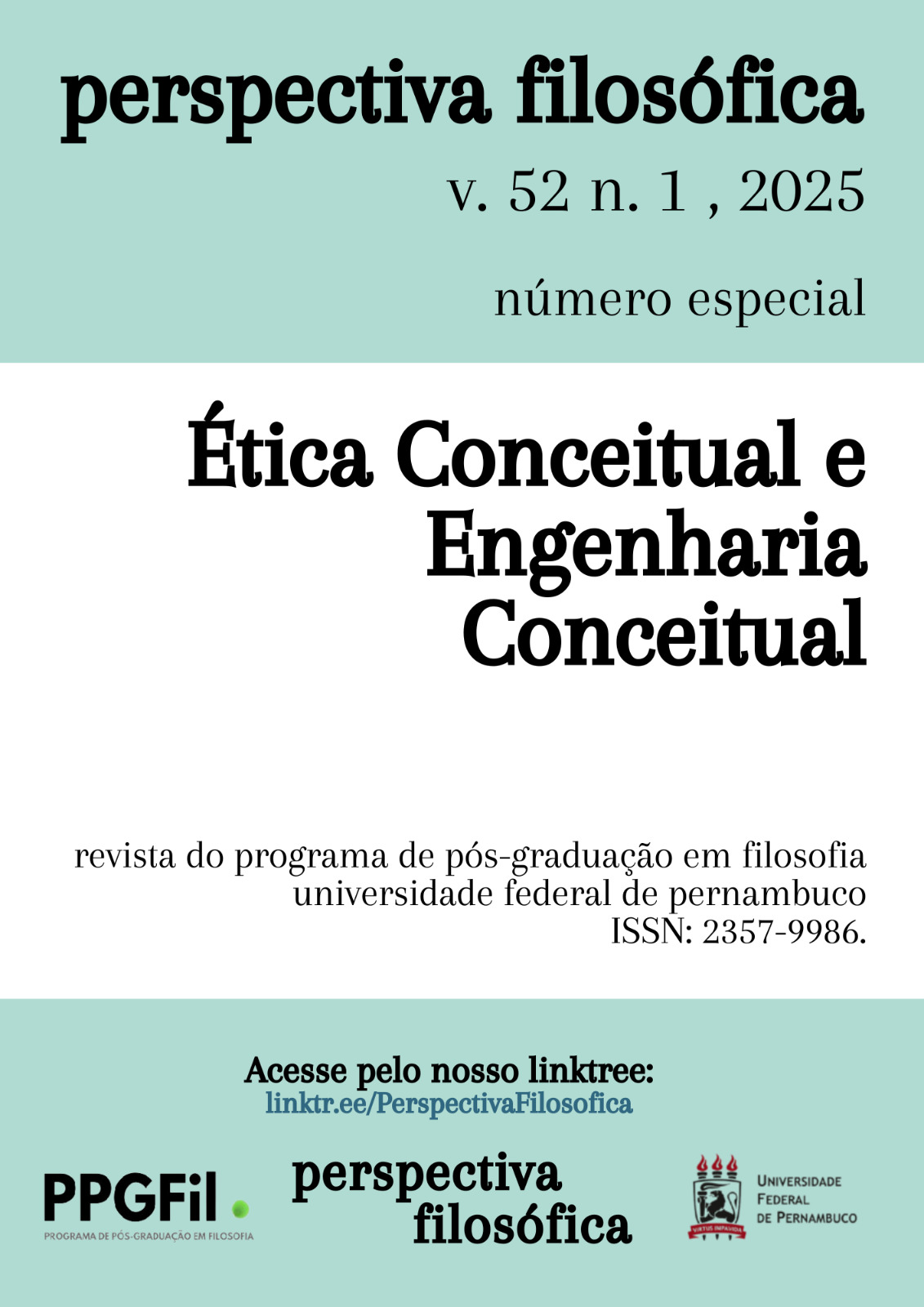Um método pragmático para o trabalho conceitual normativo
DOI:
https://doi.org/10.51359/2357-9986.2025.266963Palavras-chave:
metafísica, trabalho conceitual, engenharia conceitualResumo
Este artigo apresenta um método pragmático para o trabalho conceitual normativo em metafísica. Argumenta-se que a metafísica envolve tarefas conceituais descritivas e normativas, concentrando-se em como estas últimas devem ser conduzidas. Ao contrastar uma “abordagem metafísica” com uma “abordagem pragmática” alinhada com o deflacionismo metaontológico, a autora aborda preocupações sobre o abandono da metafísica tradicional.
O núcleo do método pragmático está na compreensão dos conceitos pela sua função. Essa visão orientada pela função permite explicar intuições sobre a estrutura do mundo, garantindo escolhas conceituais não arbitrárias e fornecendo uma base para a crítica, tudo isso sem depender de fatos metafísicos.
Referências
Appiah, Anthony Kwame. 1992. In my Father’s House. New York: Oxford University Press.
Ayer, Alfred Jules. 1946. Language, Truth and Logic. New York: Dover Publications.
Bell, Clive. 1914/977. Art as Significant Form: The Aesthetic Hypothesis. In George Dickie and R. J. Sclafani (eds.), Aesthetics: A Critical Anthology (pp. 36–48). New York: St. Martin’s Press.
Blackburn, Simon. 1999. Think: A Compelling Introduction to Philosophy. Cambridge: Cambridge University Press.
Brandom, Robert. 2013. Global Anti-Representationalism? In Huw Price (ed.), Expressivism, Pragmatism and Representationalism. Cambridge: Cambridge University Press.
Brigandt, Ingo. 2010. The Epistemic Goal of a Concept: Accounting for the Rationality of Semantic Change and Variation. Synthese 177 (1):19–40.
Burgess, Alexis, and Plunkett, David. 2013a. Conceptual Ethics I. Philosophy Compass 8 (12):1091–101.
Burgess, Alexis, and Plunkett, David. 2013b. Conceptual Ethics II. Philosophy Compass 8 (12):1102–10.
Burgess, Alexis. 2013. Keeping ‘True’: A Case Study in Conceptual Ethics. Inquiry. http://dx. doi.org/10.1080/0020174X.2013.851866.
Cappelen, Herman. 2018. Fixing Language: An Essay on Conceptual Engineering. Oxford: Oxford University Press.
Dasgupta, Shamik. 2018. Realism and the Absence of Value. Philosophical Review 127 (3):279–322. Davies, David. 2004. Art as Performance. Oxford: Blackwell.
Dutilh Novaes, Catarina. 2015. Conceptual Genealogy for Analytic Philosophy. In J. Bell, A. Cutrofello, and P. M. Livingston (eds.), Beyond the Analytic-Continental Divide: Pluralist Philosophy in the Twenty-First Century (pp. 75–108). London: Routledge.
Eklund, Matti. 2015. Intuitions, Conceptual Engineering, and Conceptual Fixed Points. In Christopher Daly (ed.), Palgrave Handbook of Philosophical Methods (pp. 363–85). London: Palgrave Macmillan.
Foucault, Michel. 2006. A History of Madness. London: Routledge.
Gert, Bernard, Culver, Charles M., and Danner Clouser, K. 2006. Death. In Bioethics: A Systematic Approach (2nd edn) (pp. 283–308). Oxford: Oxford University Press.
Haslanger, Sally. 2000. Gender and Race: (What) Are They? (What) Do We Want Them to Be? Nous 34 (1):31–55.
Haslanger, Sally. 2012. Resisting Reality. Oxford: Oxford University Press.
Horwich, Paul. 1999. Truth (2nd edn). Oxford: Oxford University Press.
Jackson, Frank. 1998. From Metaphysics to Ethics: A Defence of Conceptual Analysis. Oxford: Oxford University Press.
Ludlow, Peter. 2006. The Myth of Human Language. Croatian Journal of Philosophy 6 (3):385–400.
Millikan, Ruth Garrett. 1984. Language, Thought and Other Biological Categories. Cambridge, Mass.: MIT Press.
Plunkett, David. 2015. Which Concepts Should We Use? Metalinguistic Negotiations and the Methodology of Philosophy. Inquiry 58 (7–8):828–74.
Plunkett, David. 2016. Conceptual History, Conceptual Ethics, and the Aims of Inquiry. Ergo 3 (2):27–64.
Plunkett, David, and Sundell, Tim. 2013. Disagreement and the Semantics of Normative and Evaluative Terms. Philosopher’s Imprint 13 (23):1–37.
Preston, Beth. 1998. Why is a Wing like a Spoon? A Pluralist Theory of Function. The Journal of Philosophy 95 (5):215–54.
Price, Huw. 2011. Naturalism without Mirrors. Oxford: Oxford University Press.
Price, Huw. 2013. Expressivism, Pragmatism and Representationalism. Cambridge: Cambridge University Press. Richard, Mark. forthcoming. Meanings as Species.
Ryle, Gilbert. 1949. The Concept of Mind. Chicago: University of Chicago Press.
Sider, Theodore. 2011. Writing the Book of the World. Oxford: Oxford University Press.
Strawson, Peter. 1963. Carnap’s Views on Constructed Systems versus Natural Languages in Analytic Philosophy. In Paul Arthur Schilpp (ed.), The Philosophy of Rudolf Carnap, Volume XI: Library of Living Philosophers (pp. 503–18). Peru, IL: Open Court Publishing.
Strawson, Peter. 1992. Analysis and Metaphysics: An Introduction to Philosophy. Oxford: Oxford University Press.
Sundell, Timothy. 2011. Disagreement, Error, and an Alternative to Reference Magnetism. Australasian Journal of Philosophy. DOI: 10.1080/00048402.2011.614266 (pp. 1–17).
Thomasson, Amie L. 1999. Fiction and Metaphysics. Cambridge: Cambridge University Press.
Thomasson, Amie L. 2007. Conceptual Analysis in Phenomenology and Ordinary Language Philosophy. In Michael Beaney (ed.), The Analytic Turn: Analysis in Early Analytic Philosophy and Phenomenology. London: Routledge.
Thomasson, Amie L. 2015. Ontology Made Easy. New York: Oxford University Press.
Thomasson, Amie L. 2016. What Can We Do, When We Do Metaphysics? In Giuseppina D’Oro and Soren Overgaard (eds.), The Cambridge Companion to Philosophical Methodology. Cambridge: Cambridge University Press.
Thomasson, Amie L. 2017a. Metaphysical Disputes and Metalinguistic Negotiation. Analytic Philosophy 58 (1):1–28.
Thomasson, Amie L. 2017b. Metaphysics and Conceptual Negotiation. Philosophical Issues 27:364–82.
Thomasson, Amie L. forthcoming. Norms and Necessity. New York: Oxford University Press.
Van Inwagen, Peter. 2016. The Neo-Carnapians. Synthese. DOI 10.1007/s11229-016-1110-4.
Warren, Mark. 2015. Moral Inferentialism and the Frege-Geach Problem. Philosophical Studies 172 (11):2859–85.
Williams, Michael. 2010. Pragmatism, Minimalism, Expressivism. International Journal of Philosophical Studies 18 (3):317–30.
Yablo, Stephen. 2005. The Myth of the Seven. In Mark Eli Kalderon (ed.), Fictionalism in Metaphysics. Oxford: Oxford University Press.
Downloads
Publicado
Edição
Seção
Licença
Copyright (c) 2025 Luiz Helvécio Segundo Marques

Este trabalho está licenciado sob uma licença Creative Commons Attribution 4.0 International License. A Revista Perspectiva Filosófica orienta seus procedimentos de gestão de artigos conforme as diretrizes básicas formuladas pelo Conselho Nacional de Desenvolvimento Científico e Tecnológico (CNPq). http://www.cnpq.br/web/guest/diretrizes
Autores que publicam nesta revista concordam com os seguintes termos:
Os autores mantém os direitos autorais e concedem à revista o direito de primeira publicação, sendo o trabalho simultaneamente licenciado sob https://creativecommons.org/licenses/by/4.0/deed.pt_BR que permite o compartilhamento do trabalho com reconhecimento da autoria e publicação inicial nesta revista.
Os autores têm autorização para assumir contratos adicionais separadamente, para distribuição não-exclusiva da versão do trabalho publicada nesta revista, com reconhecimento de autoria e publicação inicial nesta revista (Consultar http://opcit.eprints.org/oacitation-biblio.html).

Esta revista está licenciada com uma Licença Creative Commons Atribuição 4.0 Internacional.













